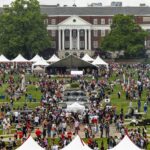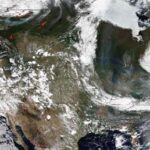By: Lauren Kirkwood
Publisher: Council on the Environment
Published: November 20, 2013
Last year, atmospheric and oceanic sciences doctoral student Rebekah Esmaili attended a meeting of the International Precipitation Working Group in Brazil, where she was struck by how limited access to data affects scientists in regions outside the U.S.
When Esmaili heard through a Council on the Environment email to her department that Earthzine — an online resource for news about environmental policy and technology — was holding a student essay contest on "Science Technology for Observing Earth's Climate," she knew her entry would revolve around the importance of increasing worldwide access to scientific information.
Esmaili received a 2nd place award of $500 for her essay, titled "Publication Without Representation: How Improving Satellite Data Dissemination Can Democratize and Advance Earth Science."
"I feel strongly about open access to journals and data," she said. "Scientists often focus on pushing the boundaries th
rough scientific advances and big observation projects. However, researchers overlook the importance of data availability."
In Brazil, Esmaili said she met many young scientists from South and Central America who inspired the "human aspect" that she emphasized in her essay, along with the technological advances.
"Researchers outside of the U.S. do not always have the same access to computer hardware, data, and ground observing equipment," she said. "If scientists share data it lowers these barriers and increases international participation."
In earth science, Esmaili said, there is a heavy emphasis on North America and Europe, and less on South America or Africa. Increasing data sharing between international scientists makes research more efficient and comprehensive.
"Increasing internal participation can improve our big picture understanding of the planet," she said. "There's a pool of international researchers who work with low research budgets; sharing data lowers hardware requirements and saves time, which can help them work more effectively. We can increase the global scientific workforce and output by making it easier for everyone to do their research."
Esmaili, whose research involves tracking storms and studying the evolution of their life cycles on a global scale, said she was glad to have the opportunity to share her views on data access with a wider audience.
"It's something I feel passionate about – I am glad it was well received," she said.
Reprinted from Council on the Environment with permission. cone.umd.edu/index.php/news-events/513-umd-doctoral-student-wins-2nd-place-in-environmental-essay-contest.






